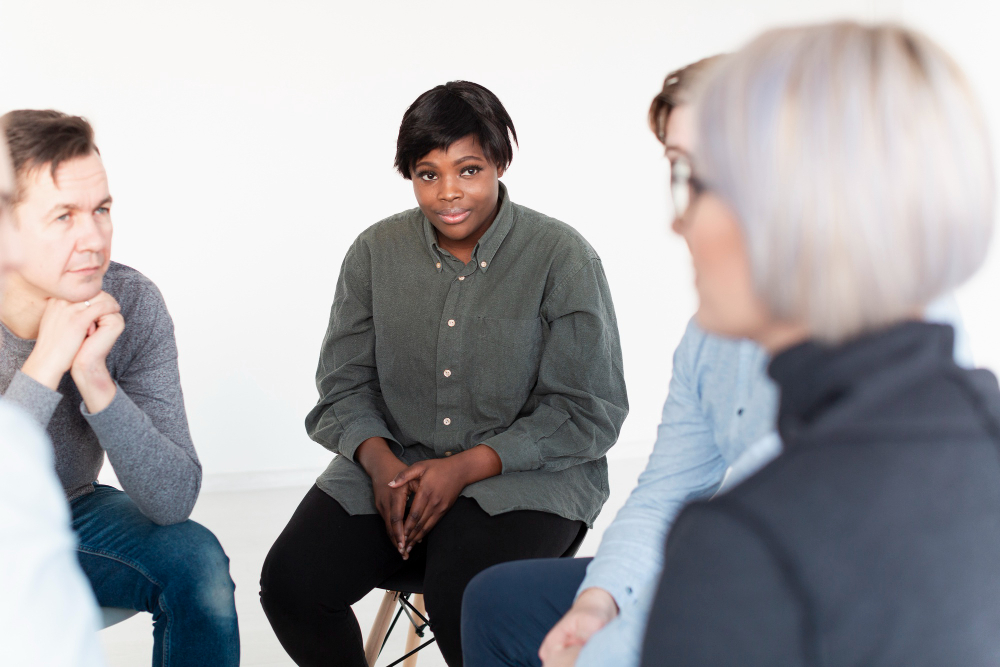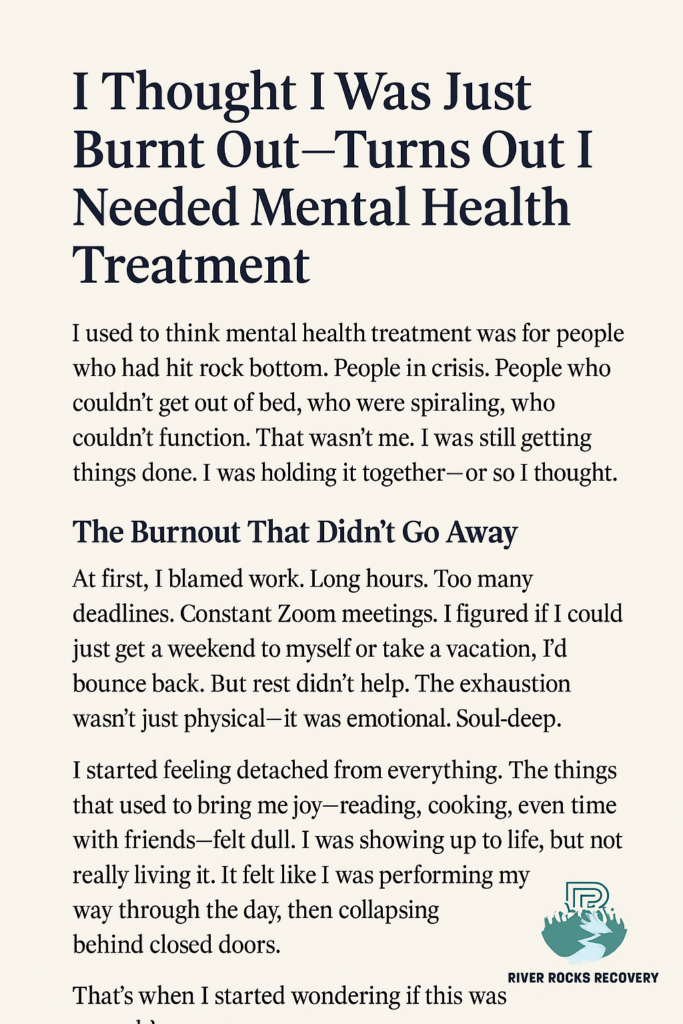I used to think mental health treatment was for people who had hit rock bottom. People in crisis. People who couldn’t get out of bed, who were spiraling, who couldn’t function. That wasn’t me. I was still getting things done. I was holding it together—or so I thought.
But behind that high-functioning mask, I was unraveling.
The Burnout That Didn’t Go Away
At first, I blamed work. Long hours. Too many deadlines. Constant Zoom meetings. I figured if I could just get a weekend to myself or take a vacation, I’d bounce back. But rest didn’t help. The exhaustion wasn’t just physical—it was emotional. Soul-deep.
I started feeling detached from everything. The things that used to bring me joy—reading, cooking, even time with friends—felt dull. I was showing up to life, but not really living it. It felt like I was performing my way through the day, then collapsing behind closed doors.
That’s when I started wondering if this was something more.
High-Functioning Doesn’t Mean You’re Okay
What scared me most was how easy it was to hide. I still went to work. I still smiled when I had to. I still paid bills, answered emails, cracked jokes. From the outside, nothing looked wrong. But inside? I felt like I was fading.
I wasn’t sleeping. I forgot basic things. I was irritated all the time and then ashamed for snapping at people I loved. And more than anything, I felt like I was walking through life in grayscale.
I didn’t want to die. But I didn’t know how to keep living like this either.
The Breaking Point Was Quiet
It wasn’t a crisis that pushed me to seek help. No big meltdown. No dramatic moment. Just a quiet night, sitting on my kitchen floor, realizing I hadn’t felt like myself in a long, long time.
I searched “mental health treatment in Ohio” on my phone. Not really sure what I was looking for. Just… hoping someone out there understood.
That’s how I found River Rocks Recovery.
What Mental Health Treatment Actually Looked Like
I was scared to call. Afraid they’d tell me I wasn’t “sick enough” or that I needed to hit some invisible threshold before getting help. But that’s not what happened.
The person on the other end of the phone was calm, kind, and just listened. They didn’t pressure me or talk over me. They asked questions that made me feel seen—not judged.
When I started treatment, I expected awkward group sessions and clinical detachment. Instead, I found warmth. I found people who didn’t need me to perform or prove anything. People who talked about things I thought I was the only one feeling.
I learned that mental health treatment isn’t just about fixing what’s “broken.” It’s about making space to feel, process, and reconnect. It’s about learning how to live in a way that doesn’t leave you constantly drained.
What Changed—and What Didn’t
I didn’t come out of treatment with all the answers. But I came out with tools. Language for what I was experiencing. A better understanding of how my past, my patterns, and my perfectionism were impacting my mental health.
I learned how to set boundaries without guilt. How to recognize burnout before it swallowed me whole. How to sit with emotions instead of stuffing them down or brushing them off.
And maybe most importantly—I stopped seeing asking for help as a weakness.
“It didn’t make me weak to ask for help. It made me human.”
– Outpatient Client, 2024
You Deserve to Feel Like Yourself Again
If you’re in Ohio and quietly struggling, I want you to know: you don’t have to wait until you crash to get support. You’re allowed to want more than just surviving. You’re allowed to want peace, clarity, and a version of yourself that isn’t constantly on edge.
Mental health treatment gave me that. And it can be the first step for you, too.
FAQ: Mental Health Treatment in Ohio
What are the signs that I might need mental health treatment?
You might benefit from treatment if you:
- Feel persistently anxious, numb, or overwhelmed
- Struggle with sleep or appetite changes
- Experience difficulty concentrating or remembering things
- Withdraw from social connections
- Feel like you’re “holding it together” on the outside but falling apart inside
If you’re unsure, it’s okay to start with a conversation. You don’t need a diagnosis to ask for support.
Do I need to have a specific diagnosis to start treatment?
No. At River Rocks Recovery, we welcome people at all stages—including those who just feel “off” and want to understand what’s going on. You don’t need to label your experience to receive care.
What kinds of treatment are available?
River Rocks Recovery offers various outpatient mental health services in Ohio, including individual therapy, group therapy, and support for co-occurring conditions. Treatment is personalized, so it meets you where you are.
How long does treatment usually last?
It depends on your needs. Some people benefit from short-term support; others stay connected longer for ongoing care. We work with you to build a plan that feels manageable and right for your goals.
Is treatment confidential?
Yes. Your privacy is protected, and all care is provided in a safe, judgment-free environment.
Ready to Talk?
You don’t have to figure this out alone. Call River Rocks Recovery today at (888) 905-6281 and talk with someone who truly listens. Whether you’re unsure or ready to take that next step, we’re here to walk with you—no pressure, just support.





























